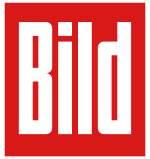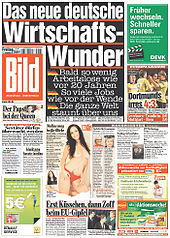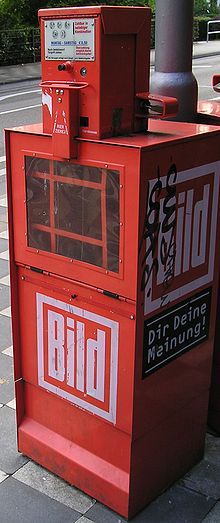- Bild
-
Bild 

The September 17, 2010 front page of BildType Daily tabloid, except Sundays and public holidays Format Tabloid ("nordisch" size) Owner Axel Springer AG Editor Kai Diekmann Founded 1952 Political alignment Right-wing populism Headquarters Zeitungsgruppe BILD, Axel-Springer-Straße 65, D-10888 Berlin Official website bild.de The Bild (formerly Bild-Zeitung[clarification needed], lit. Picture Newspaper; pronounced [ˈbɪlt]) is a German tabloid published by Axel Springer AG. The paper is published from Monday to Saturday, while on Sundays, Bild am Sonntag (lit. Picture on Sunday) is published instead, which has a different style and its own editors. Bild is tabloid in style, although actually broadsheet in size. It is the best-selling newspaper outside Japan and has the sixth-largest circulation worldwide.[1] Its motto, prominently displayed below the logo, is unabhängig, überparteilich (independent, nonpartisan). Another slogan used prominently in advertising is Bild dir deine Meinung!, which translates as "Form your own opinion!" (i. e., by reading Bild), a pun based on the fact that in German, Bild (more properly Bild'!, a short form of Bilde!) can also be understood as the imperative form of bilden, "to shape, to form".
Bild's nearest English-language stylistic and journalistic equivalent is often considered to be the British national newspaper The Sun—the second highest selling European tabloid newspaper—with which it shares a degree of rivalry.[2][3][4]
Contents
History
Bild was founded by Axel Springer in 1952. It mostly consisted of pictures (therefore the name BILD, German for picture). Bild soon became the best-selling tabloid, by a wide margin, not only in Germany, but in all of Europe, though essentially to German readers. Through most of its history, Bild was based in Hamburg. Bild moved its headquarters to Berlin in March 2008, stating that it was an essential base of operations for a national newspaper. It is printed nationwide with 32 localized editions. Special editions are printed in some favoured German holiday destinations abroad, in Spain, Italy, Greece and Turkey.
Although it is still Germany's biggest paper, the circulation of Bild, along with many other papers, has been on the decline in recent years. After selling more than five million copies every day in the 1980s, circulation dropped below the four million mark in 2002 for the first time in almost 30 years. By the end of 2005, the figure dropped to 3.8 million copies.[5]
Bild was modeled after the British tabloid the Daily Mirror; although its paper size is larger, this is reflected in its mix of celebrity gossip, crime stories and political analysis. However, its articles are often considerably shorter compared to those in British tabloids, and the whole paper is thinner as well. Bild has been known to use controversial devices like sensational headlines and invented 'news' to increase its readership. The policy of having a topless woman on its front page virtually every day has also been criticised by German feminist groups.
From the outset, the editorial drift was unabashedly conservative and nationalist. The GDR was referred to as the Soviet Occupation Zone (German: Sowjetische Besatzungszone or SBZ). The usage continued well into the 1980s, when Bild began to use the GDR's official name cautiously, putting it in quotation marks. Bild heavily influenced public opinion against the German student movement of the years following 1967, after the assassination attempt on activist Rudi Dutschke. A popular catchphrase in left-wing circles sympathetic to student radicalism was "Bild hat mitgeschossen!" (Bild shot at him too). At the height of left-wing terrorism around 1977, Bild took a strong stance that could be said to have contributed to the climate of fear and suspicion[citation needed].
After the fall of the Berlin Wall and the end of the Cold War in Europe, Bild's editorial stance seems to have become more centrist. Despite its general support for Germany's conservative parties and especially former chancellor Helmut Kohl, its rhetoric, still populist in tone, is less fierce than it was thirty years ago. Its traditionally less conservative Sunday paper Bild am Sonntag (Bild on Sunday) even supported Gerhard Schröder, a Social Democrat, in his bid for chancellor in 1998.
On the day of the election of Joseph Cardinal Ratzinger as Pope Benedict XVI, Bild ran with the now-famous headline "Wir sind Papst" ("We are Pope"). In 2004 Bild started to cooperate with fast-food giant McDonald's to sell the tabloid at its 1,000 fast food restaurants in Germany. The cooperation still goes on, often enough by advertising the restaurant chain in 'news' articles. Like The Sun, young women in skimpy clothes - called Page Three girls in the United Kingdom - appear on Bild's page one below the fold as "Seite-eins-Mädchen" or "Page One Girls".
Print locations
Bild is printed in Ahrensburg, Hanover, Berlin, Leipzig, Essen, Neu-Isenburg, Esslingen, Munich and Syke. Foreign locations exist in Spain in Madrid, Palma de Mallorca and Las Palmas. In Italy in Milan, in Greece in Athens and in Antalya, Turkey. The foreign locations cater mostly for German tourists and expatriates.
Editors-in-Chief
- 1952: Rolf von Bargen
- 1952–1958: Rudolf Michael
- 1958–1960: Oskar Bezold
- 1960–1962: Karl-Heinz Hagen
- 1961–1971: Peter Boenisch
- 1971–1980: Günter Prinz
- 1981–1988: Horst Fust
- 1988–1989: Werner Rudi
- 1989–1990: Peter Bartels
- 1990–1992: Hans-Hermann Tiedje
- 1992–1997: Claus Larass
- 1998–2000: Udo Röbel
- 2001–present: Kai Diekmann
Criticism
It is argued Bild's thirst for sensationalism results in the terrorizing of prominent celebrities and stories are frequently based on the most dubious evidence. The journalistic standards of Bild, or the lack thereof, are the subject of frequent criticism by German intellectuals and media observers.
- BILDblog ([1]), a German weblog that when founded was dedicated solely to documenting errors and fabrications in Bild articles, is among Germany's most popular blogs. In 2005, BILDblog received the Grimme Online Award for its work. Since 2009 BILDblog also reports on errors and fabrications in other newspapers from Germany and elsewhere.
- Heinrich Böll's 1974 novel The Lost Honor of Katharina Blum, and the 1975 movie based on it, used a fictional stand-in for Bild to make a point about its allegedly unethical journalistic practices. Böll's public words on the Bild's coverage of the Baader-Meinhof Gang activities in the early 1970s were: [what Bild does] isn’t cryptofascist anymore, not fascistoid, but naked fascism, agitation, lies and dirt.
- In 1977 investigative journalist Günter Wallraff worked for four months as an editor for the Bild tabloid in Hanover, giving himself the alias of "Hans Esser". In his books Der Aufmacher (Lead Story) and Zeugen der Anklage (Witnesses for the Prosecution) he portrays his experiences on the editorial staff of the paper and the journalism which he encountered there. The staff commonly displayed contempt for humanity, a lack of respect for the privacy of ordinary people and widespread conduct of unethical research and editing techniques.
- In 2004 Bild was publicly reprimanded twelve times by the Deutscher Presserat (German Press Council). This amounts for a third of the reprimands this self-regulation council of the German press declared that year.
See also
- List of German newspapers
- List of newspapers (by country)
- The Lost Honour of Katharina Blum
- Günter Wallraff, a German journalist at times attacked by Bild
References
- ^ World Association of Newspapers: World’s 100 Largest Newspapers, 2005
- ^ Sex, Smut and Shock: Bild Zeitung Rules Germany Spiegel Online 25 April 2006
- ^ Germans equalise with penalty gibe in a shootout over sun loungers and clichés
- ^ A week in football: Don't mention the Wall or the lack of hotel rooms - Telegraph
- ^ IVW - Informationsgemeinschaft zur Feststellung der Verbreitung von Werbeträgern e.V
External links
- www.bild.de, the paper's website in German and with English news
- BILDblog, a Bild watchblog
- BBC, German tabloid mocks UK tourists
Categories:- Newspapers published in Germany
- German-language newspapers
- Media in Hamburg
- Publications established in 1952
Wikimedia Foundation. 2010.

